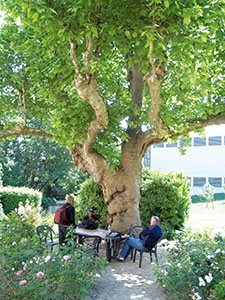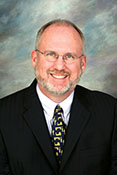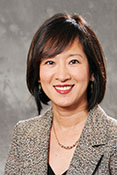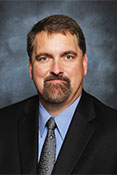By JULIE MINDA
When most doctors enter the medical field, they are eager to ease people's suffering and help them live healthy lives. But, over time given the unrelenting pace and pressure of the profession, doctors can become weary and cynical, according to Dr. Michael Marino, St. Joseph Health chief medical information officer.
It was a conversation about this phenomenon that inspired Marino and another physician connected with Irvine, Calif.-based St. Joseph Health to develop a formation program that gives doctors the opportunity to reflect on their call to heal and to rediscover their passion for that mission.
In the Physician Leadership Formation program, Marino said, "we get physicians back to the reason they entered medicine, which is caring for the most vulnerable."

From left, Deborah Proctor, Dr. James Kyle and Dr. Michael Marino chat at the motherhouse of the Sisters of St. Joseph in Lyon, France, during a pilgrimage several years ago. That conversation between Proctor, the St. Joseph Health chief executive, and the physician leaders inspired the creation of a program that twins physician formation with leadership training.
Designed for both current and aspiring physician leaders affiliated with St. Joseph Health and its two California regions, the yearlong program covers both formation and leadership development. It aims to ground physicians in St. Joseph Health's mission, to encourage them to tap into their own spirituality, to build up their management skills and to prepare them for new roles they may take on under health care reform.
The system supported and developed the program to heal "what is painful in medical practice and (provide) time to reconnect with the spiritual aspect" of caregiving, said St. Joseph Health President and Chief Executive Deborah Proctor.
Longing for meaning
St. Joseph Health hosts an annual pilgrimage for system executives to Southern France, where the system's founding congregation, the Sisters of St. Joseph, began. It was during a pilgrimage several years ago, in reflection at the sisters' motherhouse in Lyon, that Proctor, Marino and physician leader Dr. James Kyle were lamenting physician burnout and brainstorming solutions.
"We were sitting around a tree in the courtyard talking about how stressed doctors are feeling — they're longing for meaning, and some of the changes in health care have taken away that meaning," Proctor said. "Our doctors feel disenfranchised, and they don't feel they are fully our partners."
Some of the reasons for the burnout include the pressure to see more patients in less time, reimbursement shortfalls and changing expectations under health care reform, said Marino.
When Marino and Kyle returned to the U.S., they developed and pursued an idea for a formation program exclusively for St. Joseph Health physicians. St. Joseph Health's Jeff Thies and Fr. Gregory Kirsch worked with the two on building and implementing the Physician Leadership Formation program. Thies is vice president of a leadership institute at St. Joseph Health, and Fr. Kirsch is St. Joseph Health director of ministry formation.
Heart and head
The formation program launched in 2013 includes four in-person sessions that convene from a Friday afternoon through a Saturday evening. Thies, Fr. Kirsch and Marino present the sessions.

Marino
Each gathering contains reflection time, activities to foster a bond among participants and exploration of a formation topic and a leadership topic. Formation segments cover the heritage and tradition of St. Joseph Health and its founding congregation, the attendees' personal call to medicine, holistic care, self-care, value-based decision making, clinical ethics and organizational ethics. The leadership segments cover strengthening relationships, having an impact through influence, leading change and facilitating teamwork effectively.
Each year, St. Joseph Health forms one cohort for the five hospitals and medical foundation in its Northern California region, and one for the five hospitals and medical foundation in its Southern California region. (California law prohibits hospitals from directly employing physicians; commonly, system-affiliated doctors work for medical foundations.) Each of the hospitals and medical foundations nominate doctors to participate in the formation program.
Game plan
Health care delivery models emerging under reform require that doctors, hospitals, and other providers along the care continuum more seamlessly coordinate patient care. Increasingly, health care providers are assuming some financial risk for managing the health of populations of people. This is particularly true under value-based payment models that reward efficient care that results in good patient outcomes and may penalize inefficient, ineffective care that drives up the cost of care and increases the likelihood of relapse or other undesirable outcomes.
Under these changes and others, clinicians "have to be like-minded, with the same mission, or it won't work," said Marino.
"We need to have a deep relationship between the health care system and the physicians in the community," said Proctor.
"There is a need for real, shared leadership," said Thies.
Formation program graduate Dr. Connie Bartlett added that "health care reform will be physician-driven, and this can only occur with physician leadership." Bartlett is a pediatrician and executive at the Santa Ana. Calif., office of St. Joseph Heritage Medical Group.
Another program graduate, Dr. Michael Ritter, is medical director of the emergency department of St. Joseph Health–Mission Hospital in Mission Viejo, Calif. He said physicians must be able to work with others in a team and to be cognizant of the business side of health care. Population health models assume that physicians will be able to engage and motivate people in making behavior changes that can prevent the development of some chronic diseases, or lead to better chronic disease management. "You need physicians who can connect to people and work with them. You can't be just focused on the transaction; you can't just be numbers-driven. You need to have a deeper connection with patients."
Leadership tools
According to a feedback survey, 90 percent of first session participants found the program content to be germane and practical for their work; and 95 percent were satisfied with the program.

Bartlett

Ritter
Bartlett said the formation "reinforced my strengths and revealed my weaknesses and gave me tools to continue my growth and development as a physician leader."
Ritter said the session helped him build connections with other physicians with whom he normally would not interact; and he's drawn on those relationships since the 2013 sessions concluded.
Marino said when the physicians in the program take the time to reflect on their work, and to spend time talking with their peers, he sees a transformation take place. "I watch them relax. I see them get in touch with why they got into medicine, rather than focusing on the negatives."
Fr. Kirsch said participants valued the formation experience because it opened the door to reflection, meditation, introspection on self and enriched relationships. "They expressed gratitude for this investment in them."
Thies said, "They have an appreciation for the opportunity for deeper reflection on our ministry and mission and the call to Catholic health care."
Copyright © 2014 by the Catholic Health Association
of the United States
For reprint permission, contact Betty Crosby
or call (314) 253-3477.